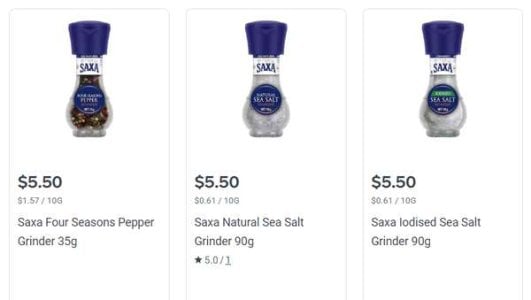Consumers share their frustration about one kitchen staple from supermarkets
By
Danielle F.
- Replies 15
When navigating the aisles of Coles and Woolworths, shoppers pick up kitchen staples without a second thought, trusting that these items will serve their purpose without hassle.
However, there's one product causing quite a stir among consumers, and it's not because of its seasoning abilities.
Saxa's salt and pepper grinders were made in a way that makes them difficult to open and refill.
This frustration led to a wave of DIY solutions circulating online.
While other brands of salt and pepper grinders could be easily opened and refilled, Saxa's design made it a challenge for both consumers and recyclers.
The combination of glass and plastic also became a significant headache when separating them for recycling.
Richard Kirkman of Veolia Australia and New Zealand expressed his frustration about the complicated situation in an interview.
'The secret to recycling is having a lot of stuff made from the same thing,' Kirkman said, citing plastic bottles as an example of a product that is easy to gather and process due to its uniformity.
Despite Veolia investing millions in recycling innovation, some products still pose significant challenges due to their design.
Kirkman pointed out that other supermarket items with small plastic parts continue to frustrate him.
'When you buy lemon juice and pop that tiny little bit of plastic off the top—it's like a fingernail's worth—it's never going to be recycled,' Kirkman pointed out.
'Lots of other bottles have that little pull-away piece of plastic. You don't need to have that!'
Kirkman believed that product designers could create reusable and recyclable packaging, as seen in European manufacturers.
Kirkman pushed for a collective effort in Australia to standardise packaging design.
This could change the way manufacturers make their packaging and facilitate more effective recycling and return systems.
Saxa, owned by American multinational brand Kraft Heinz, has yet to respond to the questions about its product design.
This silence left consumers and environmentalists alike wondering whether the company would take steps to address the issue.

Have you encountered similar issues with kitchen products or packaging? Share your experiences and any creative solutions you've come up with in the comments below. Together, we can push for change and ensure that convenience doesn't come at the cost of our planet's health.
However, there's one product causing quite a stir among consumers, and it's not because of its seasoning abilities.
Saxa's salt and pepper grinders were made in a way that makes them difficult to open and refill.
This frustration led to a wave of DIY solutions circulating online.
While other brands of salt and pepper grinders could be easily opened and refilled, Saxa's design made it a challenge for both consumers and recyclers.
The combination of glass and plastic also became a significant headache when separating them for recycling.
Richard Kirkman of Veolia Australia and New Zealand expressed his frustration about the complicated situation in an interview.
'The secret to recycling is having a lot of stuff made from the same thing,' Kirkman said, citing plastic bottles as an example of a product that is easy to gather and process due to its uniformity.
Despite Veolia investing millions in recycling innovation, some products still pose significant challenges due to their design.
Kirkman pointed out that other supermarket items with small plastic parts continue to frustrate him.
'When you buy lemon juice and pop that tiny little bit of plastic off the top—it's like a fingernail's worth—it's never going to be recycled,' Kirkman pointed out.
'Lots of other bottles have that little pull-away piece of plastic. You don't need to have that!'
Kirkman believed that product designers could create reusable and recyclable packaging, as seen in European manufacturers.
Kirkman pushed for a collective effort in Australia to standardise packaging design.
This could change the way manufacturers make their packaging and facilitate more effective recycling and return systems.
Saxa, owned by American multinational brand Kraft Heinz, has yet to respond to the questions about its product design.
This silence left consumers and environmentalists alike wondering whether the company would take steps to address the issue.
Key Takeaways
- Saxa salt and pepper grinders have non-refillable plastic and glass bottles, leading shoppers to share tips on how to break them open.
- The grinders pose a significant challenge for recyclers since the plastic and glass are difficult to separate.
- Richard Kirkman, CEO of Veolia in Australia and New Zealand, highlighted how packaging made from multiple materials could be harder to recycle.
- Kirkman called for manufacturers to standardise packaging to improve recycling practices in the country.








